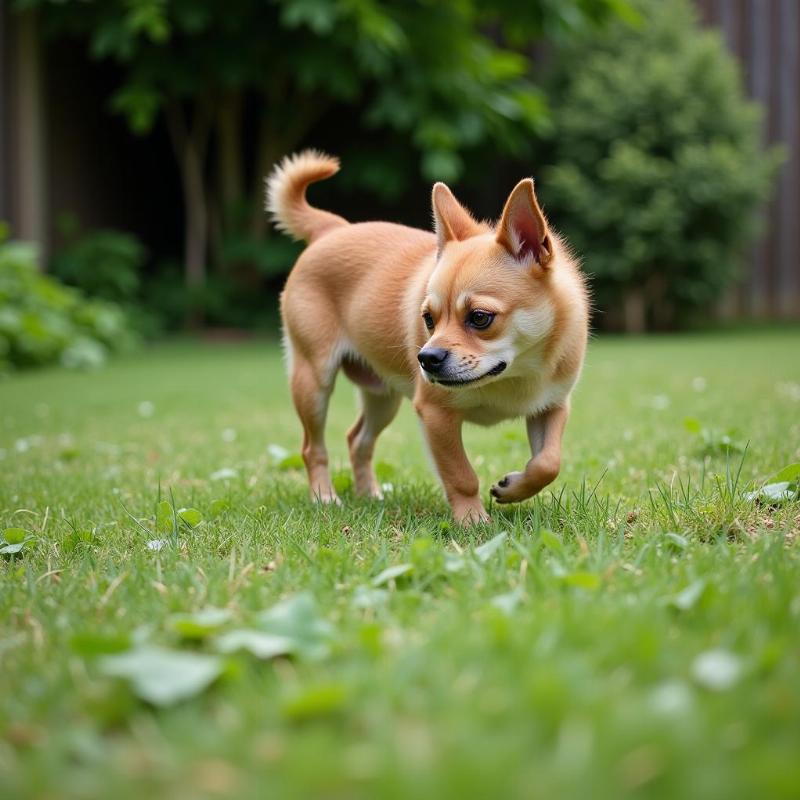Dealing with a dog that refuses to pee in the yard can be frustrating for any owner. This common issue can stem from various reasons, ranging from medical conditions to behavioral issues and environmental factors. Understanding the root cause is key to resolving this potty problem and establishing a healthy routine for your furry friend. This guide will delve into the potential reasons why your dog won’t pee in the yard and offer practical solutions to help you reclaim your lawn.
Why Won’t My Dog Pee in the Yard?
Several factors can contribute to your dog’s reluctance to relieve themselves in the designated area. Medical issues like urinary tract infections, bladder stones, or even arthritis can make urination painful, causing your dog to associate the yard with discomfort. Behavioral reasons, such as anxiety, fear, or territorial marking preferences, can also play a significant role. Changes in the environment, like a new pet, loud noises, or even a different type of grass, can also disrupt your dog’s potty habits. Identifying the underlying cause is the first step towards a solution.
Medical Reasons Your Dog Might Avoid the Yard
As mentioned earlier, medical conditions can make urination uncomfortable, leading your dog to avoid the yard. Urinary tract infections (UTIs) are a common culprit, often indicated by frequent urination attempts, straining, or bloody urine. Bladder stones can also cause similar symptoms, and both conditions require veterinary attention. Arthritis or other mobility issues can make squatting difficult, leading your dog to seek alternative, more comfortable spots to relieve themselves. If you suspect a medical problem, consult your veterinarian immediately. They can diagnose the issue and recommend appropriate treatment.
Behavioral Reasons for Yard Avoidance
Behavioral factors can also contribute to this frustrating issue. Anxiety, perhaps triggered by loud noises or unfamiliar surroundings, can disrupt your dog’s potty routine. Fear of the yard itself, perhaps due to a negative experience, can also be a factor. Some dogs might be exhibiting marking behavior, preferring to urinate on vertical surfaces rather than the grass. Understanding your dog’s personality and past experiences is crucial to addressing these behavioral issues.
 Anxious dog avoiding peeing in the yard
Anxious dog avoiding peeing in the yard
Environmental Factors Affecting Your Dog’s Potty Habits
Environmental changes can also disrupt your dog’s established potty routine. Introducing a new pet, for example, can create territorial anxieties and lead to marking behaviors. Loud noises from construction or traffic can make your dog feel unsafe and reluctant to use the yard. Even seemingly minor changes like a new type of grass or mulch can deter your dog, especially if it has a strong scent or texture.
Training Tips to Encourage Yard Potty Breaks
Establishing a consistent potty routine is essential. Take your dog out to the yard at regular intervals, especially first thing in the morning, after meals, and before bedtime. Use positive reinforcement, rewarding successful potty breaks with praise and treats. Avoid punishment, as this can create negative associations with the yard and exacerbate the problem. Patience and consistency are key to success.
When to Seek Professional Help
If your dog continues to refuse to pee in the yard despite your efforts, it’s time to consult a professional. A veterinarian can rule out any underlying medical conditions, while a certified dog trainer or behaviorist can help address behavioral issues. They can provide tailored advice and training techniques based on your dog’s specific needs.
Conclusion
Addressing your dog’s reluctance to pee in the yard requires patience, understanding, and a multifaceted approach. By considering medical, behavioral, and environmental factors, you can pinpoint the root cause and implement effective solutions. Remember, consistency, positive reinforcement, and professional guidance when needed are key to helping your furry friend establish a healthy potty routine.
FAQ
-
My dog used to pee in the yard, but suddenly stopped. What should I do? Consider any recent changes in your dog’s environment or routine. Consult your veterinarian to rule out medical issues.
-
How can I make my yard more appealing for my dog to pee in? Create a designated potty area with a preferred surface, like real grass or specific mulch. mulch for dog potty area
-
Is it okay to punish my dog for not peeing in the yard? No, punishment can create negative associations with the yard. Focus on positive reinforcement instead.
-
What are the signs of a urinary tract infection in dogs? Frequent urination attempts, straining, blood in the urine, and excessive licking of the genital area can be signs of a UTI.
-
How can I help my anxious dog feel more comfortable in the yard? Create a safe and calming environment by minimizing loud noises and distractions. keep dog off yard signs You may also consult a veterinarian about anxiety medication.
-
My dog prefers to pee on my neighbor’s lawn. What can I do? This is likely marking behavior. Consult a dog trainer or behaviorist for guidance on addressing this issue. spray to deter dogs from digging
-
I recently switched to a new type of grass in my yard. Could this be why my dog won’t pee there? Yes, the new scent or texture might be deterring your dog. best grass seed with dogs Try transitioning gradually or returning to the previous type of grass.
Beautdogs.us is your premier resource for all things dog-related in the US. We offer expert advice on dog breeds, care, and lifestyle, providing a wealth of information for both new and experienced dog owners. From training tips to product recommendations, Beautdogs.us is your trusted companion on your dog ownership journey. Contact us today for personalized guidance: Email: [email protected], Phone: +1 501-555-7529.